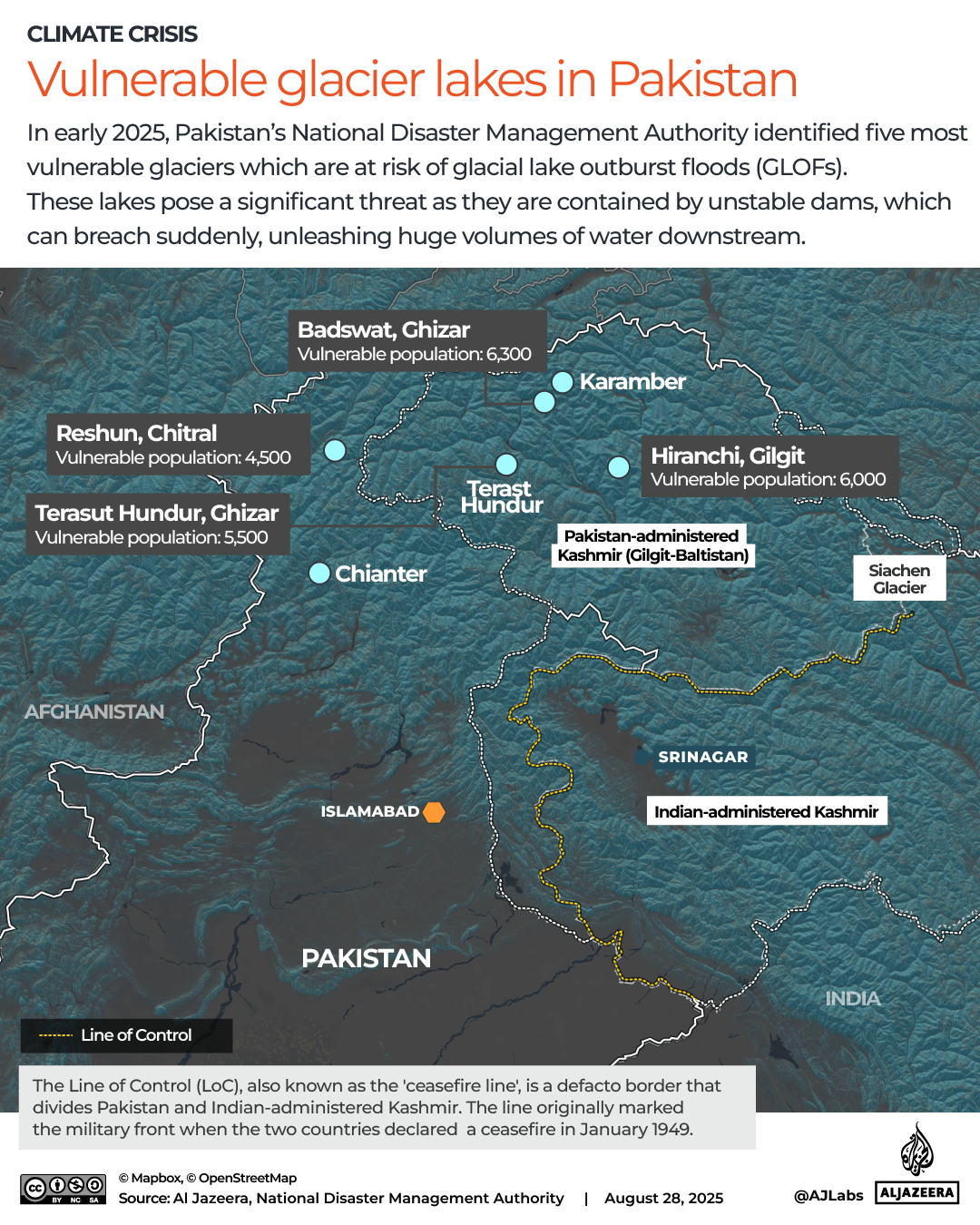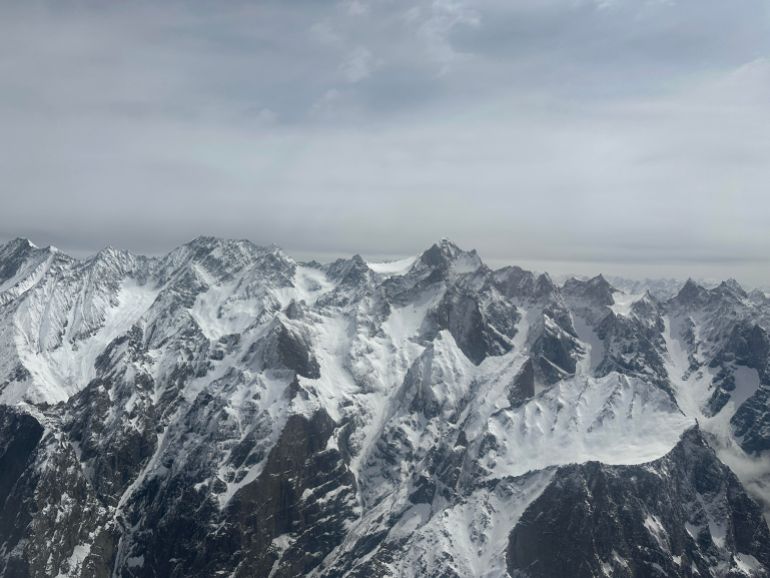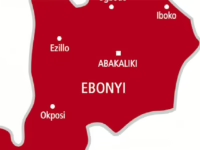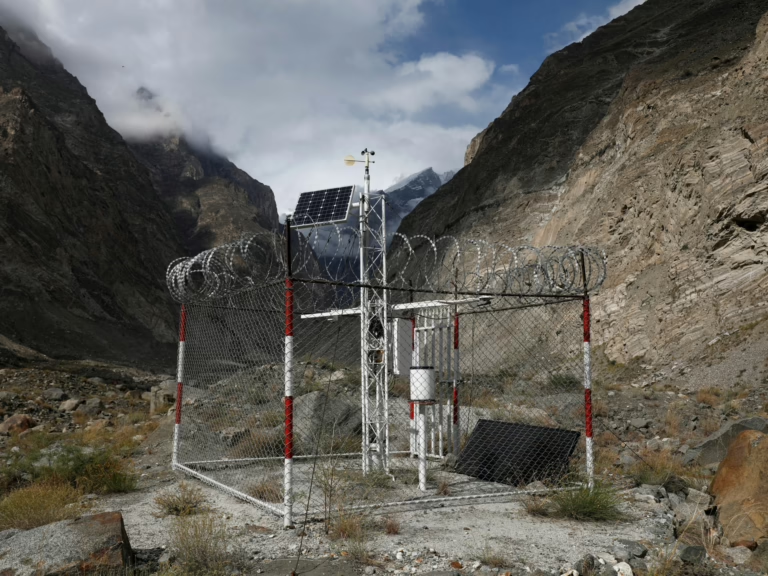Skardu, Pakistan – In the dead of night, Wasiyat Khan was jolted awake by a thunderous blast, initially fearing that the mountains themselves were collapsing and triggering a landslide.
Wasiyat, a shepherd from Roshan Valley in Ghizer, nestled within the rugged Gilgit-Baltistan region of northern Pakistan, had brought his family and livestock to higher pastures during the warmer season for grazing.
As they scrambled for safety, Wasiyat soon realized the explosive noise was caused by a glacier breaking apart. Their temporary shelter was rapidly engulfed by surging floodwaters, and his thoughts immediately turned to the downstream villages lying in the flood’s trajectory.
At an altitude exceeding 3,000 meters and shrouded in darkness, external assistance was out of reach. Without hesitation, Wasiyat leapt across rocky terrain to reach a spot with mobile reception, where he promptly warned approximately 300 villagers.
“Within half an hour, we received confirmation that the villagers had evacuated safely and no casualties occurred,” Wasiyat recounted to local reporters. “Though safe, we lost everything-our homes, possessions, even basic necessities to keep warm amid the freezing glacier winds.”
“When rescue teams finally reached us hours later and brought us back, we discovered our houses and lands buried under mudslides, but thankfully, no lives were lost.”
Glacial lake outburst floods (GLOFs) are a frequent hazard in northern Pakistan, a region that harbors around 13,000 glaciers. With climate change accelerating glacier melt, Pakistan’s National Disaster Management Authority (NDMA) warned in March that the consequences this year could be severe.
NDMA’s recent forecast indicates that snowfall across Pakistan, especially in Gilgit-Baltistan, is expected to be below average in the upcoming months. This decline in snow cover could hasten glacier retreat by exposing ice earlier in the season, thereby increasing the risk of GLOFs in high-altitude zones.
To mitigate these dangers, the government primarily depends on early warning systems (EWS). These systems aim to minimize fatalities, injuries, economic damage, and protect vital infrastructure while bolstering climate resilience.
An EWS operates through a network of sensors and gauges that gather real-time environmental data, which meteorologists and experts analyze to detect imminent threats and forecast disasters. Numerous EWS installations across vulnerable valleys in Gilgit-Baltistan and Khyber Pakhtunkhwa currently relay live data to the Pakistan Meteorological Department.
The Role of Indigenous ‘Human EWS’
Despite technological advancements, many northern Pakistanis place greater trust in traditional, community-based knowledge rather than relying solely on electronic early warning systems.
Mohammad Hussain, a shepherd from Skardu Valley, shared an experience with Al Jazeera where, during a summer storm, he noticed intense lightning followed by an unusual roaring noise after nearly an hour of rain.
Upon stepping outside to gather his livestock, he witnessed a powerful flash flood sweeping down the valley, uprooting trees and carrying massive rocks. Acting swiftly, he alerted the villagers, enabling a timely evacuation before the floodwaters arrived.
Hussain recounted how his grandfather described traditional warning methods, such as lighting large signal fires, firing guns, or using specific sound patterns to alert communities. Even today, natural indicators like sudden heavy rainfall, distinctive cloud formations, erratic animal behavior, and unique roaring sounds serve as vital cues to anticipate flash floods when technological systems are unavailable.
On one occasion, Hussain attempted to ignite a fire to warn villagers, but daylight and heavy rain rendered it ineffective. He then fired his rifle three times-a prearranged distress signal. Hearing the gunshots, villagers activated the mosque’s loudspeaker alarm, prompting a swift evacuation.
Although the flood caused considerable economic damage, no lives were lost, underscoring the effectiveness of this community-driven “human EWS.”

Pakistan is ranked among the top ten countries most vulnerable to climate change, despite contributing less than 1% to global greenhouse gas emissions. According to the World Bank’s 2023 report, Pakistan’s average temperature has risen by 1.3°C (2.34°F) since the 1950s-double the global average increase.
Musadiq Malik, Pakistan’s climate change minister, recently told Al Jazeera, “These glacial floods bring devastating death, illness, and mass displacement. It’s a harsh reality we must confront.” Between 2019 and 2022, Pakistan experienced nearly 90 such floods.
Why Technology Isn’t Enough
Despite significant investments in EWS infrastructure, many communities remain skeptical of their reliability due to frequent equipment failures and inadequate follow-up by authorities.
A June report by Pakistan’s Friday Times highlighted that although the $37 million GLOF-II project launched in 2017 introduced new sensors, sirens, and local training, there remains no real-time communication link between village-level human observers and official rescue teams.
The report cautioned, “Technology alone cannot save lives if standard operating procedures are ignored, rescue protocols are neglected, and trust is absent at the grassroots level.”

Several villagers interviewed in Gilgit-Baltistan echoed these concerns, expressing distrust in the equipment’s functionality and criticizing officials for taking undue credit for lives saved by the system.
“The EWS installations in Gilgit-Baltistan were implemented without involving local authorities and communities, which undermined their effectiveness,” explained Zaki Abbas, a climate journalist based in Islamabad.
“Last year, a local activist informed me that around 20 systems had been set up at various locations but were non-operational for various reasons. This issue has even been raised in the Gilgit-Baltistan legislative assembly, with opposition leaders demanding an inquiry into the failures, but no investigation has been initiated.”
“The true measure of their ineffectiveness is that recent GLOF warnings have come from local shepherds, whose timely alerts saved entire villages, rather than from these costly systems.”
Addressing these challenges requires concerted efforts from the government and partners managing EWS deployment. The UN Development Programme noted in February that “limited funding, technical expertise gaps, data deficiencies, communication hurdles, weak institutions, and evolving climate threats” complicate early warning efforts worldwide.
In August, Pakistan’s prime minister awarded Wasiyat and two other shepherds from Ghizer $28,000 each in recognition of their bravery and life-saving actions, praising their “courage and responsibility as a legacy to be remembered.”
As erratic weather patterns, shifting snowfall, and glacier melt continue to impact Pakistan’s northern regions, it appears that local communities will increasingly depend on these “human sentinels” amid the shortcomings of formal early warning systems and the trust deficit surrounding them.






















